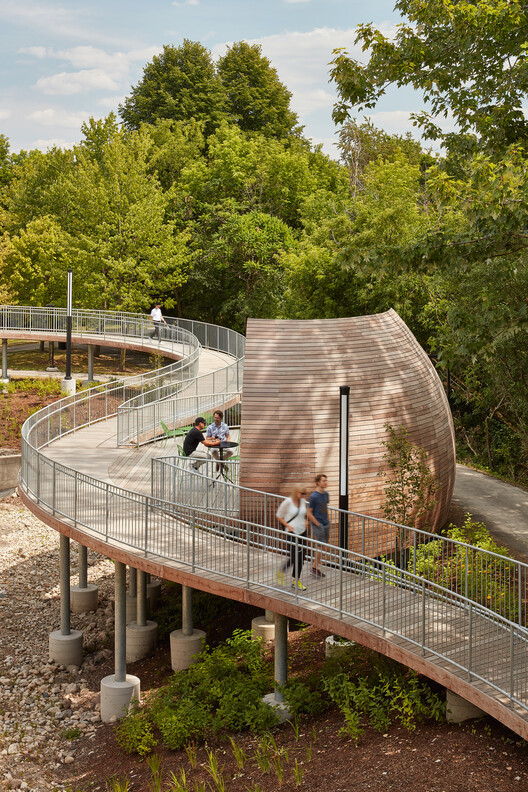查看完整案例

收藏

下载

翻译
Architects:Martin Simmons Sweers Architects
Area:2105 m²
Year:2022
Photographs:Riley Snelling
General Contractor:Marant Construction
Structural Engineer:MTE
Landscape Architect:The Planning Partnership
Landscaper:Moser Landscape Group
Partner In Charge: Jason Martin
Project Architect: Greg Piccini
Senior Contract Administrator: Jesse French
Senior Technologist: Steve Dietrich
Designer: Andraz Kavcic
City: Waterloo
Country: Canada
Architectural Vision + Design. The project began with the client’s desire to provide a more fulfilling work experience for staff and to encourage greater enjoyment of the existing nature surrounding The Manufacturers Life Insurance Company (“Manulife”). To this end, the architects envisioned a new kind of office space – an “open-air office” that would not only provide an enticing outdoor setting for coffee and lunch breaks but would also become an alternative place for employees to perform their daily work activities.
Inspired by the site’s beautiful natural surroundings, a meandering and fully accessible pathway weaves its way through the tree canopy, connecting a series of pods strategically nestled into the landscape, offering an amazingly comfortable environment to work, collaborate, socialize, and play. The new terrace is directly linked to the existing cafeteria, providing a large outdoor dining area.
From the terrace, a sinuous, raised wood walkway connects to three wood gathering pods while gently winding through the landscape, terminating at a lower pathway that leads into the larger trail system of Forwell Creek. The slope of the walkway provides barrier-free access from the lower landscape level to the main floor level of the cafeteria. It allows users to experience numerous vantage points at varying elevations as they move through the landscape.
Project Details. Special care was taken during design to provide a gentle and continuously sloping walkway, following the barrier-free path of travel requirements to eliminate the need for intermediate landings. This strategy became paramount to the overall geometry and arrangement of the project, as the architects worked with the site and maximum slope constraints to help generate the precise arcs and splines of the walkway and adjoining pods.
The selection of wood as the primary material was integral to achieving an inviting, comfortable, and timeless design that fits well with the surrounding landscape. While celebrated for its aesthetic and sensory qualities, wood was also selected for its ease of construction and suitability to the design’s geometry and form. The Ipe decking delivers a warm, tactile experience to those walking through the landscape, while the curved-slat screens provide moments of privacy or a place to rest in the shade.
Galvanized steel was used for the primary structural system for both the walkway and shading structures, with a wood frame acting as the secondary system. The sloping and bending walkway ranges in elevation with a consistent width of 2 meters, extending a total area of 260 m2. Each piece of the boardwalk was custom cut along a continuous curve on radii ranging between 8.1 meters and 15.6 meters.
The sides of the walkway were finished with bent wood headers that are spliced at each steel outrigger. The wood shading pods are supported by curved galvanized steel plate webs with bent galvanized steel flanges. The largest gathering pod is 123 m2, while the two smaller pods are each 75 m2. The wood walkway and pods provide a pleasing contrast to the large (260 m2) stone dining terrace that connects to the main Manulife cafeteria.
客服
消息
收藏
下载
最近
















